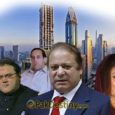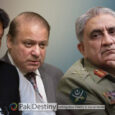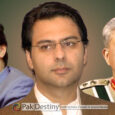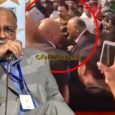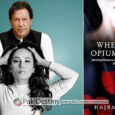
By Irum Saleem
There was set pattern in the defeat of PTI leaders in April 21 by-polls. The issue of Form-45 was also settled down this time around.
PM Shehbaz who had won Kasur NA-132 seat with a margin of 28,000 votes in Feb 8 general elections, his party candidate won it with a whopping margin of 56,000. PTI President Chaudhry Parvez Elahi who won Feb election with a margin of 50,000 through a For-45 was declared defeated with a margin of 50,000 in by-polls.
Similarly, PTI’s Moonis Elahi was made to lose by PML-N M Nawaz with a margin of 14,000 votes on PP-158 Lahore.
A clear message was given in this pattern.
Dawn columnist Abbas Nasir said the ongoing estrangement between the PTI and the establishment is challenge enough for the political party and its leadership, given the ground reality in Pakistan where all mainstream parties, including Imran Khan’s, have strengthened the role of extra-parliamentary forces in the day-to-day running of government for narrow, temporary and, therefore, meaningless gains. The cumulative effect of their capitulation has been an ever-growing footprint of the establishment in the affairs of the state. Since the institution maintains that it is itself responsible for its own accountability, it is rarely held to account. Today, the challenge that is this hybrid system is staring all political parties in the face.
“The PTI is confronting even greater challenges. One hint came from party leader Sher Afzal Marwat, who said in a TV interview that ‘Saudi Arabia was part of the US regime change conspiracy’ which led to the toppling of the Imran Khan government in the spring of 2022 in a no-confidence vote — this, as a high-level Saudi delegation was discussing multibillion-dollar investments in Pakistan,” he said.
Since he made this statement, predictably, denials have been issued by several party leaders. Mr Marwat himself clarified that what he said was his ‘personal opinion’ and not the party position. But any political commentator who believes Mr Marwat spoke for himself has to be naïve. He is very close to Mr Khan and is credited by many in the party as the man who energised the PTI ahead of the elections in the forced absence and imprisonment of the founder. In March, and again in April, the lawmaker was nominated by his party to run for the influential position of the chairman of the National Assembly’s Public Account Committee. This decision alone ought to clear the air regarding his proximity to the PTI supremo.
Donald Trump may have nice things to say about Imran Khan, but he likes the Saudis more.
“The initial bonhomie between the Saudi crown prince and Mr Khan was evident during the prince’s visit to Pakistan. The then PM personally took the wheel to drive his august guest, who reciprocated by saying that Pakistan should see him (the crown prince) as its ambassador to Saudi Arabia. Soon after, relations between the two seemed to go downhill,” Abbas Nasir said.
Speculation abounds about the reasons for relations turning sour. It includes a supposed conversation on board a Saudi royal business jet that the crown prince had placed at Mr Khan’s disposal to travel to New York to address a UN General Assembly session. Nobody has been able to draw an official response but the rumour was that Mr Khan made some unkind remarks about the Saudi royal and these were brought to the latter’s attention.
Whether the crew overheard them or the jet had bugging devices is unclear. What was evident was that, on the way back home, the jet returned to New York soon after take-off because the pilot reported a technical fault. And Mr Khan and his entourage had to make other travel arrangements.
“There can be no doubt that PTI supporters among the overseas Pakistanis in the US, including many influential and wealthy figures, have been lobbying relentlessly for the party and their leader. This is in addition to work being done by professional lobbyists,” he said.
The result was the letter that a number of Congressmen/ women wrote to their administration in support of Imran Khan. A congressional committee hearing was also called where US Deputy Secretary of State Donald Lu was among those who testified.
It should be remembered that Mr Lu’s informal discussion with the then Pakistan ambassador to the US was cited by Imran Khan as evidence of ‘a US regime change conspiracy’ against his government. He waved a copy, ostensibly of the ‘cipher’ sent by the envoy detailing that conversation, at an Islamabad public meeting to add weight to his allegation.
While the joint letter and even the congressional hearing may have gone some way in ensuring that Congress members kept their wealthy donors and voters onside, their impact was minimal in securing any concession for the PTI or its founder.
“The US presidential election, despite Donald Trump’s early lead over President Joe Biden in the opinion polls, will only be decided in November. Some PTI supporters are optimistic that a Trump win, a certainty for them, may translate into a change of fortunes for their jailed leader. They believe that the camaraderie on display between the two leaders at the White House meeting indicated that Donald Trump held Mr Khan in high esteem,” Nasir said.
Against this backdrop, Mr Marwat’s views assume greater significance. Donald Trump may have nice things to say about Imran Khan, but he likes the Saudis more as they are crucial allies and a cornerstone of the US policy (under Biden and more so under Trump) in the Middle East. The Trump family, particularly the former president’s son-in-law, has business interests, which the Saudis can enhance immensely.
“Even otherwise, the expectation of a change in the US leading to a change in Pakistan seems grossly unreal and exaggerated. Therefore, the safest bet for any party would be to rely on public support and make a concerted effort with political entities to drive meaningful change,” Nasir said. PAK DESTINY

